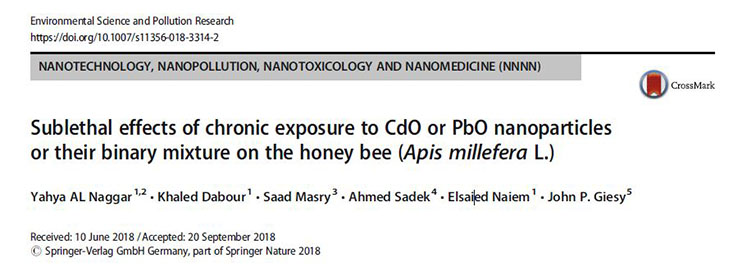Cadmium and lead-based nanotechnologies are increasingly used in agricultural, industrial, and biological processes; however, potential adverse effects of nanomaterials on honey bees had not been assessed.
In this study, effects of exposures to sublethal concentrations of PbO and CdO nanoparticles (NPs), either separately or in combination on honey bee (Apis mellifera) workers, were assessed.
Honey bee workers were orally exposed for 9 days under laboratory conditions to sublethal concentrations (20% of LC50) of CdO (0.01 mg/ml−) and PbO (0.65 mg/ml−) NPs either separately or combined. Effects on survival, feeding rate, activity of acetylcholinesterase (AChE), and expression of selected stress-related detoxifying enzymes were quantified.
Survival and feeding rates decreased particularly in bees fed sugar syrup containing CdO NPs or binary mixtures of NPs of both metal oxides. Expressions of genes involved in detoxification of xenobiotics were affected by various combinations. Expression of catalase was 13.6-fold greater in bees consumed sugar syrup diet containing binary mixture of sublethal concentrations of both CdO and PbO NPs than it was in unexposed, control bees.
AChE activity in heads of honey bees was inhibited by 3.8-, 3.0-, and 2.8-fold relative to control, respectively, in response to exposure to Cd or/and Pb oxide NPs. This result indicates potential neurotoxic effects of these NPs to honey bees. CdO NPs exhibited greater potency to honey bees. Overall, sublethal concentrations of CdO or/and PbO NPs resulted in detrimental effects on honeybee workers.







